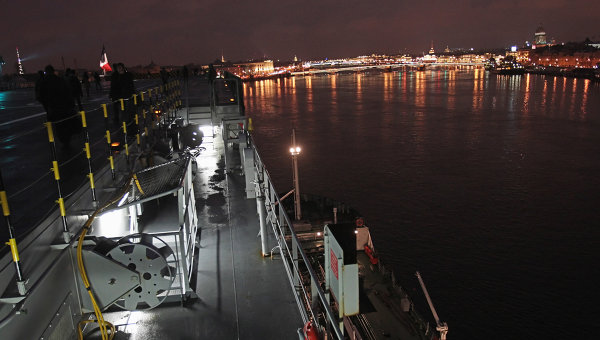
France Stonewalls US Attempts to Discourage Mistral Warship Sale to Russia
Publication: Eurasia Daily Monitor Volume: 7 Issue: 220
By:

The risk-fraught prospect of Western arms sales to Russia was not an agenda item at NATO’s annual summit, just held in Lisbon. Although such sales, on top of Russia’s own rearmament programs, can increase Russian military capabilities on NATO’s eastern borders, the Alliance avoids dealing with this issue. Such reluctance reflects variously a perceived need of Russian support on Afghanistan, sheer mercantilist considerations, or West-European notions of cooperative security with Russia, potentially thinning out NATO. The French-proposed sale of four Mistral-class helicopter carrying, amphibious assault ships to Russia is an emblematic case, potentially a precedent-setter.
France, backed by several West-European countries and the Alliance’s Secretary-General, Anders Fogh Rasmussen, has successfully prevented any discussion of the Mistral affair in NATO. Outside the alliance, however, US officials have raised some objections bilaterally with the Quai d’Orsay and French defense ministry. The US Defense Secretary, Robert Gates, Under Secretary, Michelle Flournoy, and Assistant Secretary, Alexander Vershbow, as well as Under Secretary of State, William Burns, made a few attempts to dissuade their French counterparts from selling the warships to Russia. In February 2010, Gates tentatively raised the matter with President, Nicolas Sarkozy, in Paris. The recent batch of WikiLeaks material casts significant new light on these discussions from US diplomatic cables.
US officials used strong words occasionally in this process. “Russian democracy has disappeared and the government is an oligarchy run by the security services,” Gates remarked to French Defense Minister, Herve Morin, in Paris, according to the US ambassador’s report from that meeting. Citing Russia’s failure to honor the Sarkozy-brokered armistice terms in Georgia, Gates cautioned Morin that a “[Mistral] sale would send the wrong message to Russia and to our Central and East European allies.” The latter “are still very concerned with Russia and are not sure how much to trust the West” (reports from ambassador Charles Rivkin to the State Department, February 8 and 22, 2010, https://cablegate.wikileaks.org).
Flournoy and Burns similarly remarked to their French counterparts that the “optics and policy behind the [Mistral] sale were perplexing,” “flying in the face” of Sarkozy’s mediating role in the Russia-Georgia conflict, potentially destabilizing for the region, and also sending the wrong messages to Russia and Europeans. Washington “would prefer that France find a different confidence-building measure [with Russia] than a Mistral sale” (cable to Secretary of State Hillary Clinton, February 10, 2010, https://cablegate.wikileaks.org).
For all their high level discussions and strong words, however, these US attempts have been sporadic, lacking in consistency or follow-up, and overshadowed by other issues on the agenda. Some of the WikiLeaks material reflects the diminishing clout of a US involved in protracted conflicts, and having to solicit cooperation from some problematic partners on multiple fronts. Thus, the January 20, 2010 meeting of the US-France Strategic Dialogue, at the level of Under Secretaries of State and Defense on the US side, focused on: Afghanistan, Pakistan, Iraq, Iran, Turkey, Russia (issues on which the US needs allies and partners more than the other way around), as well as NATO reform and missile defense (issues on which France has some special views). Amid all this, the US representatives tried unsuccessfully to dissuade the French from the Mistral deal (https://cablegate.wikileaks.org/cable/2010/02/10STATE13750.html).
From the WikiLeaks cables it seems that French officials simply stonewalled, without addressing their US counterparts’ arguments. Occasionally, French participants claimed that the proposed Mistral procurement could not significantly improve Russia’s weak naval capabilities. But, conversely, they also claimed that Russia is strong enough to invade Georgia without using Mistral ships anyway. Along with such incongruities came the non-sequiturs. One senior French official defended the proposed Mistral sale by arguing that France has excellent bilateral relations with Georgia and encourages reforms there. Another senior official responded that France’s periodic participation in NATO’s air policing mission in Lithuania (four interceptor planes stationed there by rotation) demonstrates French commitment to the Baltic States’ security, implicitly dismissing concerns over possible deployment of Russian-procured Mistral in the Baltic Sea.
Morin argued that the US objections contradicted NATO’s and Washington’s own rhetoric, which asserts Russia does not pose any security threats and is to be treated as a partner. The West, he claimed, cannot seek a strategic partnership with Russia while refusing at the same time to trust Russia with the Mistral warships. Morin did hit a vulnerable spot with this argument. The US administration’s and NATO’s public rhetoric about a new age of strategic partnership with a benign Russia, creates significant political complications for defense planning.
Whether or not the US (or other countries’) officials have continued discouraging a Mistral deal since February 2010 cannot be determined from the available evidence at this point.




